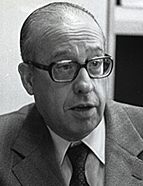

But Magalhães Godinho needed to make a living to support himself and his family. He focused on book editing, and translation. Portuguese readers will thus be able to read pivotal texts, of mandatory reading even today, an example of which is “Marcha da Humanidade” [The March of Humanity] released by Edições Cosmo in Lisbon. He also worked for himself. Among the works he published during this period A Crise da História e as suas Novas Directrizes [The Crisis of History and its New Directives] is particularly noteworthy. In this work it is possible to measure the gap between the longings of the historian in the making and what history – teaching and research – was like in Portugal at the time: one need only look at the publications of the highly pro-government Academia Portuguesa da História [Portuguese Academy of History], and the issues raised therein. A Crise da História is clearly dated. The update for which Magalhães Godinho fought was eventually attained, mainly as a result of his actions, inspiration, and supervision.
At the time he was already influenced by the Annales, and his view of the history of civilization encompassed the “history of all men, a history of the total man; more concisely: a human history.” A relevant part of this whole is played by economic history: “technical expertise and production and distribution relations determine all social organics and, from a general viewpoint, determine culture and politics. In short: economy exerts an influence on all aspects of human life (to some extent by reason of its universality).” Technical progress, always taken as that which finds its roots in Condorcet, leaves a trail of quasi-illuminist empathy for the classics. Thus, he moved on to a history of technical advances, highlighting their importance. Technical – geographical environment: action-reaction of mankind and nature. Also, the history of culture and mentalities shifted to the forefront in the work of one of Lucien Fevre’s distant disciples (for the time being), dazzled already by Le problème de l’incroyance au XVIe siècle [The Problem of Unbelief in the 16th century].
“Placing economy and technique, religion and science, art and forms of mentality, law and the social-political system at the centre of history is tantamount to an integral recasting of the concept of what we call history.” The reach and globalization of societies’ knowledge brings to bear new problems, enables new difficulties to be overcome, and offers a response to the crucial structural question “what is history for?” It is worth noting that the then still unknown Métier de l’historien [The Historian’s Craft] (1949) by Marc Bloch opens in precisely the same way. What then is history for? It is “a means for perceiving our present worries and difficulties, a means to be used as a common construction of a truly human society.
